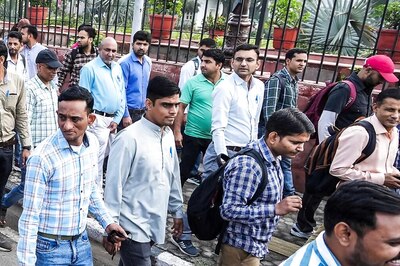
views
‘Vanniyar votes are not for others’ is a slogan the Pattali Makkal Katchi (PMK) has aggressively pushed over the last decade. Having built its identity as the party that represents the Most Backward Vanniyar caste in Tamil Nadu, the PMK modelled itself as a formidable force in northern Tamil Nadu where a third of the state’s roughly 12 per cent Vanniyar population lives.
Till 2006, the PMK successfully transferred its caste base to the AIADMK and DMK when it shifted alliances purely on the basis of political convenience and the side it went to won the mandate. However, the PMK went with the AIADMK in 2009 and the DMK in 2011 Assembly polls, and ended up on the losing side.
This dented its credibility as the ally that can tilt the scales in favour of one of the two Dravidian parties. Slowly, the two major Dravidian parties grew belligerent to the PMK’s style of ‘brute bargaining’ and decided to isolate it.
The PMK decided to project Anbumani Ramadoss, son of party founder Dr Ramadoss, as a chief ministerial force and decided to contest the 2014 parliamentary and 2016 assembly polls without an alliance with the two Dravidian parties. It tried to project a third alternative in an alliance with parties like the BJP, MDMK and DMDK in 2014.
However, the reliance on a single caste has alienated the PMK from all other social groups, thus leaving it isolated. It came to a situation where the party was struggling to even win a single assembly seat on its own. It polled the Vanniyar vote, but that was not enough to get it first past the post.
Apart from disastrous results, going it alone means that in the last decade the PMK’s campaign has fiercely revolved around attacks on the two major Dravidian parties and the slogan that the Vanniyar vote will not go to the DMK or AIADMK was propagated strongly.
This led to an entire generation of youth from the Vanniyar caste growing up with the PMK’s politics of isolation and confrontation with other castes or parties. Suddenly, in 2019, they have to change gears and support the AIADMK-led alliance as the PMK joined hands with the party after a decade.
Further, since 2011, when the AIADMK came to power in Tamil Nadu, the PMK has aggressively attacked J Jayalalithaa and after her demise continued an acerbic campaign against the ruling dispensation under Chief Minster E Palaniswami. The attack on the DMK has been more muted as the DMK was out of power since 2011.
All this creates an enormous friction at the local level. A Mani, a lawyer in Arakkonam, where the PMK’s former union minister AK Moorthy will take on the DMK’s S Jagathrakshagan directly, says, “It is tough to work with the AIADMK cadre at the local level and there is huge resistance from both sides. Further, we feel sad that the PMK taught us an independent identity and has now joined an alliance.”
But he adds that they understand that this is the only way the party can survive and hence are working hard. The fear though is that in places where PMK candidates are contesting, the AIADMK votes may not necessarily shift to the party and that could spell disaster. The converse fear is true as well and AIADMK candidates are worried about ensuring transfer of PMK votes.
In fact, a cross section of PMK supporters, especially young ones, expressed serious doubts over AIADMK votes. “There have been bitter fights with other parties over the last five to six years and it’s not easy to patch up,” says Va. Shanmugam in Uthiraimerur village of Kancheepuram district.
The reason this needs careful attention is because the 2019 election in Tamil Nadu entirely hinges on the alliance arithmetic between the PMK and the AIADMK, especially in eight parliamentary seats in northern Tamil Nadu.
In fact, the deal between the AIADMK and PMK is one where the former has conceded five of the seven parliamentary seats in the PMK stronghold to the ally. In return, the PMK will not field candidates in any of the 21 assembly seats where bypolls will be held. Eight of these 21 seats fall in the PMK’s area of influence.
This shows the importance of the alliance. If it works well, the AIADMK would be comfortable in not just the Lok Sabha polls, but also the state assembly. But if it backfires, both the PMK and AIADMK will be fighting for survival.
In this backdrop, Union minister Nitin Gadkari announced at a rally in Chennai that the green corridor project between Chennai and Salem will be implemented and that he is in constant touch with the Chief Minister.
This is despite the Madras High Court quashing land acquisition for the project and the PMK opposing it. The announcement has only led to further friction and confusion among farmers who have opposed the project; and a large chunk of them are from the Vanniyar caste and PMK supporters.
It is not clear if Gadkari was aware of the ground realities, but he has certainly created more problems for a fragile grass root alliance.
Another problem is firm consolidation of minority votes behind the DMK-Congress. For instance, Arakkonam town has estimated minority population of around 50,000- 60,000 and they are keen not to let their votes get splintered. In fact, the clearest trend across the state is a categorical consolidation of the minority vote behind the DMK-Congress alliance.
Actor-politician Vijayakanth, whose DMDK is an important member of the AIADMK alliance and also has a presence in northern Tamil Nadu, hasn’t been able to campaign much due to poor health. There are fears that the DMDK’s 2.3 per cent vote base may further be eroded.
This is why everything hinges on the AIADMK-PMK equation at the grassroots. The only hope for both parties is the fact that this is an election for their very survival can catalyse the grass root cadre to bury their differences and work together.
(Author is a senior journalist. Views are personal)



















Comments
0 comment